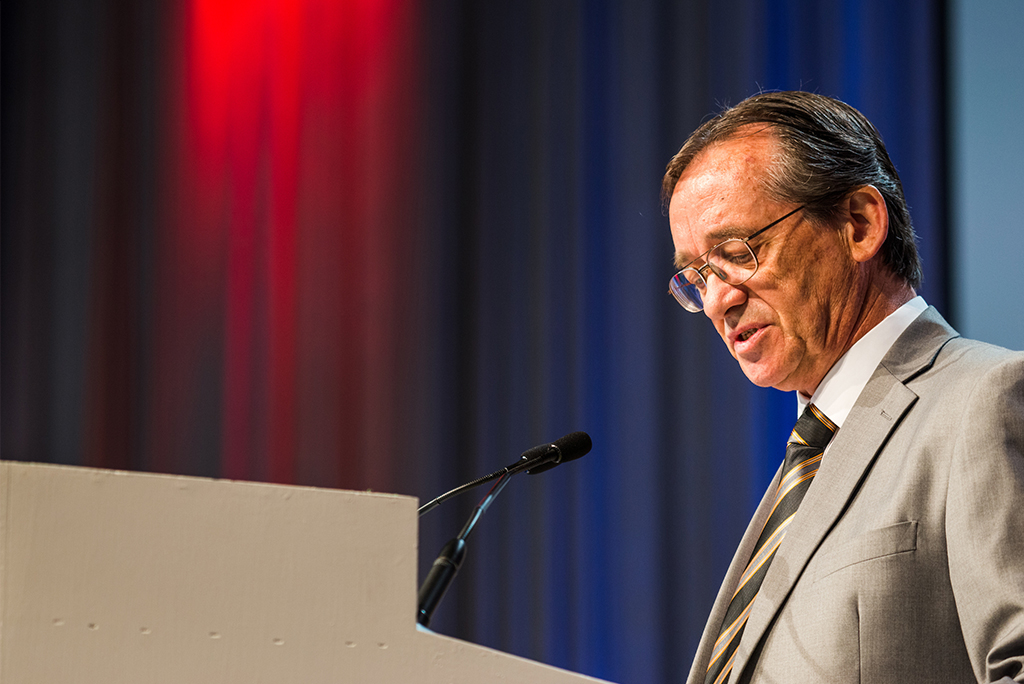The Rev. Dr. Roger Paavola, president of the LCMS Mid-South District, speaks at the 66th Regular Convention of The Lutheran Church–Missouri Synod on July 12, 2016, in Milwaukee. Paavola served as chairman of Committee 13, which prepared Resolution 13-02A, “To Regularize Status of Licensed Lay Deacons Involved in Word and Sacrament Ministry.” (LCMS/Michael Schuermann)
By Kevin Armbrust
A new online resource — available on the LCMS president’s webpage — provides answers to a set of eight Frequently Asked Questions about licensed lay deacons and the implementation of Resolution 13-02A (adopted by the 2016 LCMS convention): “To Regularize Status of Licensed Lay Deacons Involved in Word and Sacrament Ministry.”
The use of licensed lay deacons can be traced to 1989, when the LCMS in convention adopted Resolution 3-05B, which recognized a need for men to regularly preach the Word and administer the Sacraments when a pastor isn’t available.
Licensed lay deacons were to serve temporarily in Word and Sacrament ministries in these exceptional circumstances or emergencies.
With that in mind, a Whereas of the 2016 resolution (13-02A) noted, “The Synod needs to move forward together with deep concern for fidelity to the word of Christ as we confess it together and for faithfulness in the mission that Christ has given to His Church.”
That resolution Resolves, therefore, “That those deacons currently licensed for and serving in Word and Sacrament Ministry (that is, publicly preaching and administering the Sacraments) shall have until July 1, 2018, to: (1) apply to one of our seminaries for admission into an alternate route program; (2) apply for entrance into an SMP [Specific Ministry Pastor] program; or (3) apply to the regional colloquy committee for admission to the SMP roster, unless granted a waiver by his district president, the plenary of the Council of Presidents, and the appropriate regional colloquy committee.”
[button link=”https://www.lcms.org/about/leadership/president#licensed-lay-deacons-update” bg_color=”#025693″ window=”yes”]Read progress report[/button]
Implementing the resolution
Of the 591 licensed lay deacons serving as of 2017, this resolution affects approximately 250 men. These men are regularly preaching and presiding at the Lord’s Supper.
The remaining licensed lay deacons are serving in roles that assist pastors, and are not de facto pastors. These men will continue unaffected to serve in their current roles. Districts remain free to train deacons for such assisting roles in evangelism, visitation, mercy work, etc.
An October update on Resolution 13-02A noted that “significant progress has been made — policy manuals are prepared and approved by the Council of Presidents, the Commission on Constitutional Matters and the Colloquy Committee according to the procedure outlined in the resolution; instructions have been provided to the district presidents and affected licensed lay deacons so that they might apply for colloquy to the SMP roster of the Synod.”
That progress, according to LCMS First Vice-President Rev. Dr. Herbert C. Mueller Jr., represents “the church at its best — we are working together to ensure that those whom the church sends to do the pastoral work of public preaching and presiding for the Sacrament are recognized by the church as pastors.”
Mueller also serves as chairman of the Synod’s Colloquy Committee for the Pastoral Ministry.
“By the grace of God, it’s slowly coming together as the applications are beginning to come in and SMP colloquy interviews are beginning to happen. In the end, this is about the church giving recognition — through certification, divine call and ordination — to those deacons who have been serving as de facto pastors for some time already,” observed the Rev. Peter Lange, president of the LCMS Kansas District.
“What a joy it has been in the Kansas District to see such deacons respond positively to what is being offered through 13-02A,” Lange said. “And we also continue to give thanks for our many deacons who, while not affected by 13-02A, will continue in joyful and dedicated service to their congregations — in many ways other than through Word and Sacrament ministry — on a consistent and continuing basis.”
LCMS Mid-South District President Rev. Dr. Roger Paavola, who served as chairman of Committee 13, which prepared the resolution, noted the “significant results” of the resolution.
“Men eligible for ordination and installation into the office of pastoral ministry have been received and approved for regular ministry in their congregations across the Synod,” Paavola said. “Several seminary intensive classes have been conducted to assist the dedicated licensed lay deacons to prepare for colloquy.
“Compliance with the Confessions from The Book of Concord related to Word and Sacrament ministry has been accomplished, congregations are being served and more faithful laity are being encouraged to become more active in the mission and ministry of their congregations.”
Seminary intensive courses are currently offered for licensed lay deacon applicants for the SMP colloquy. In order to make sure these classes are accessible, they are offered throughout the United States, including in Fort Wayne, Ind.; Irvine, Calif.; Memphis, Tenn.; and Portland, Ore.
Working together
Mueller said he is “thankful for the cooperation and help of the Council of Presidents in preparing and implementing the application process for licensed lay deacons functioning as pastors to apply for colloquy to the SMP roster. This is an ongoing process that is just now coming up to speed, but we are, by God’s grace, on target with our schedule for its development.”
With the combined efforts of the Synod’s districts, seminaries, the COP and the men who are serving, the goal is for each of the men affected by Resolution 13-02A to begin or complete the colloquy process by summer 2018.
“Every possible means by which the Gospel of Christ can be proclaimed and spread is in place for the sake of the Kingdom of God and His salvation plan,” said Paavola.
[button link=”https://www.lcms.org/about/leadership/president#licensed-lay-deacons-update” bg_color=”#025693″ window=”yes”]Read progress report[/button]
Dr. Kevin Armbrust (kevin.armbrust@lcms.org) is manager of Editorial Services with LCMS Communications.
Posted Feb. 21, 2018





